
Vina Fay Wray was a Canadian-American actress best known for starring as Ann Darrow in the 1933 film King Kong. Through an acting career that spanned nearly six decades, Wray attained international recognition as an actress in horror films. She has been dubbed one of the early "scream queens".
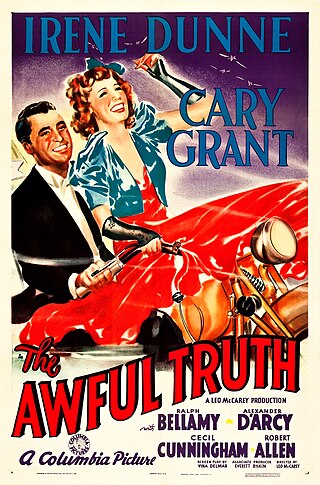
The Awful Truth is a 1937 American screwball comedy film directed by Leo McCarey and starring Irene Dunne and Cary Grant. Based on the 1922 play The Awful Truth by Arthur Richman (1886-1944), the film recounts a distrustful rich couple who begin divorce proceedings, only to interfere with one another's romances.

The Bells of St. Mary's (1945) is an American musical comedy-drama film, produced and directed by Leo McCarey and starring Bing Crosby and Ingrid Bergman. Written by Dudley Nichols and based on a story by McCarey, the film is about a priest and a nun who, despite their good-natured rivalry, try to save their school from being shut down. The character Father O'Malley had been previously portrayed by Crosby in the 1944 film Going My Way, for which he won the Academy Award for Best Actor. The film was produced by Leo McCarey's production company, Rainbow Productions.

Charles Sherman Ruggles was an American comic character actor. In a career spanning six decades, Ruggles appeared in close to 100 feature films, often in mild-mannered and comic roles. He was also the elder brother of director, producer, and silent film actor Wesley Ruggles (1889–1972).

The Big Broadcast of 1936 is a 1935 American comedy film directed by Norman Taurog, and is the second in the series of Big Broadcast movies. The musical comedy starred Jack Oakie, Bing Crosby, George Burns, Gracie Allen, Ethel Merman, The Nicholas Brothers, Lyda Roberti, Wendy Barrie, Mary Boland, Charlie Ruggles, Akim Tamiroff, Amos 'n' Andy, Bill "Bojangles" Robinson, and Argentinian tango singer Carlos Gardel.

High, Wide and Handsome is a 1937 American musical western film starring Irene Dunne, Randolph Scott, Alan Hale Sr., Charles Bickford and Dorothy Lamour. The film was directed by Rouben Mamoulian and written by Oscar Hammerstein II and George O'Neil, with lyrics by Hammerstein and music by Jerome Kern. It was released by Paramount Pictures.

Make Way for Tomorrow is a 1937 American drama film directed by Leo McCarey. The plot concerns an elderly couple who are forced to separate when they lose their house and none of their five children will take both parents.

Boots and Her Buddies was an American comic strip by Edgar Martin that ran from 1924 to 1968, syndicated by the Newspaper Enterprise Association. Some newspapers presented the strip under the shortened title Boots. The character of Boots was variously labeled the "Sweetheart of the Comics", the "Sweetheart of America" and "Everybody's Sweetheart".
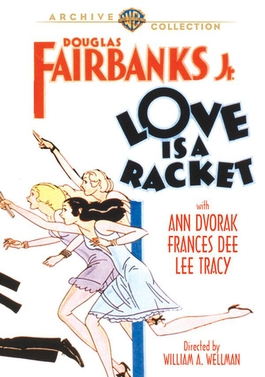
Love Is a Racket is a 1932 American pre-Code romantic comedy-drama film, starring Douglas Fairbanks, Jr. and Ann Dvorak. The movie was written by Courtney Terrett from the novel by Rian James, and directed by William A. Wellman.
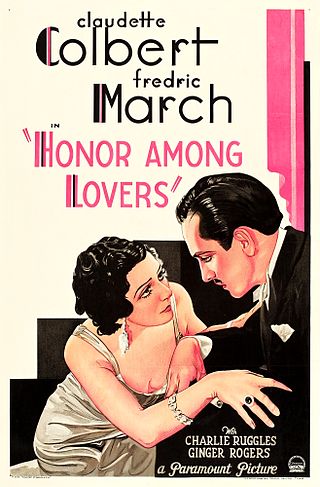
Honor Among Lovers is a 1931 American pre-Code drama film made by Paramount Pictures, directed by Dorothy Arzner. The film stars Claudette Colbert, Fredric March, Monroe Owsley, Charles Ruggles and Ginger Rogers.

Arizona is a 1940 American Western film directed by Wesley Ruggles and starring Jean Arthur, William Holden and Warren William.
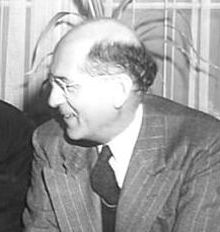
Albert E. Lewis was a Polish-born Broadway and film producer. His family emigrated to the Lower East Side of Manhattan, New York when he was a boy. He became a vaudeville comedian, then started a partnership producing one-act plays for vaudeville. Around 1930 he moved to Hollywood and worked as a film producer with Paramount, RKO, and MGM until after World War II.

Horace McMahon was an American actor. He was one of Hollywood's favorite heavies.
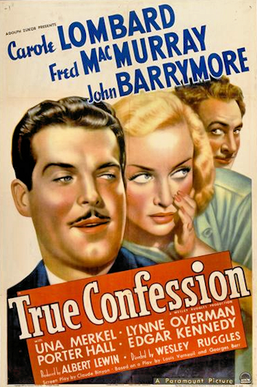
True Confession is a 1937 American screwball comedy film directed by Wesley Ruggles and starring Carole Lombard, Fred MacMurray, and John Barrymore. It was based on the 1934 play Mon Crime, written by Georges Berr and Louis Verneuil. In 1946 it was remade as Cross My Heart.
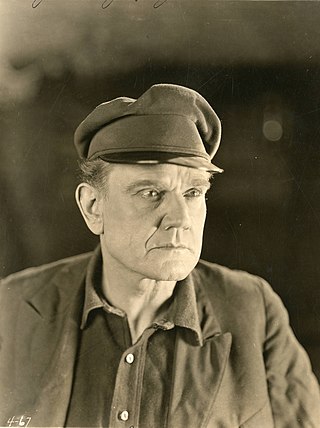
George MacQuarrie, was an American actor of the silent era.
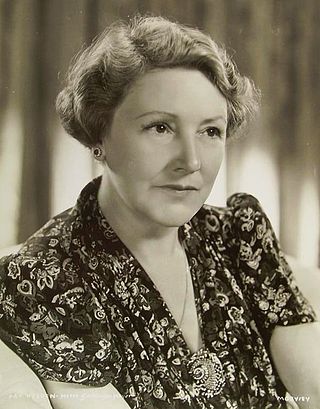
Dorothy Fay Hammerton, known professionally as Fay Holden, was a British-born, American-based actress. She was known as Gaby Fay early in her career.
When the Daltons Rode is a 1940 American Western film directed by George Marshall and starring Randolph Scott, Kay Francis and Brian Donlevy. Based on the 1931 book of the same name by Emmett Dalton, a member of the Dalton Gang, and Jack Jungmeyer Sr., the film also includes a fictional family friend who tries to dissuade the Dalton brothers from becoming outlaws.

Kiss Tomorrow Goodbye is a 1950 film noir starring James Cagney, directed by Gordon Douglas, produced by William Cagney and based on the novel by Horace McCoy. The film was banned in Ohio as "a sordid, sadistic presentation of brutality and an extreme presentation of crime with explicit steps in commission."

Paris in Spring is a 1935 black and white musical comedy film directed by Lewis Milestone for Paramount Pictures. It is based on a play by Dwight Taylor, with a screen play by Samuel Hoffenstein and Franz Schulz.
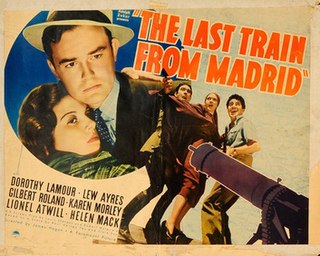
The Last Train from Madrid is a 1937 American war drama film directed by James P. Hogan and starring Dorothy Lamour, Lew Ayres and Gilbert Roland. It is set during the Spanish Civil War. The film was one of the few contemporary Hollywood films made about the war.



















